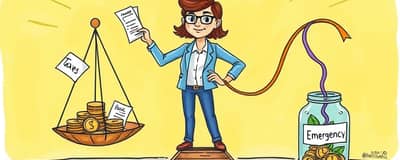Financial Planning Tips for Singles and Solo Households

Navigating personal finance alone can feel overwhelming, but with the right tools and mindset, singles and solo households can achieve lasting stability and growth.
Living on a Solo Income: Challenges & Opportunities
Living alone often brings higher per-capita living expenses compared to households with multiple earners. Housing, utilities, and insurance premiums are rarely offered at half price just because you’re single. In fact, the typical one-person household in the U.S. faces monthly expenses around $3,693, requiring an annual income of approximately $57,200 to maintain a comfortable standard of living.
Without a partner to share bills or provide financial backup, single workers must rely solely on their income. This reality can be daunting, but it also encourages independence, discipline, and creative problem solving.
Creating Your Personal Financial Plan: Step-by-Step
Building a solid financial foundation starts with a clear, realistic plan. Follow these steps to gain control of your money and focus on what matters most.
- Track every dollar: Use an app or spreadsheet to record income and expenses.
- Distinguish essentials from wants: Categorize spending into rent, utilities, groceries, and entertainment.
- Implement bucket budgeting: Allocate funds to monthly needs, emergency savings, vacations, and discretionary spending.
- Review and adjust: budget flexibility is essential to accommodate life changes and unexpected costs.
Regularly revisiting your budget ensures you stay aligned with evolving goals, whether saving for a down payment or paying off student loans.
Building Stability: Emergency Funds, Insurance, and Risk Management
Without a financial safety net from a partner, singles must build their own cushion against life’s uncertainties. Experts recommend maintaining an emergency fund equivalent to three to twelve months of living expenses.
Even modest monthly contributions build momentum over time—and offer peace of mind when medical bills or job changes arise.
Insurance complements your cash reserve. Consider:
- Health insurance plans with HSA access for tax-advantaged savings.
- Long-term disability coverage to protect income in case of illness or injury.
- Life insurance if you have dependents or co-signed debts.
Preparing for Retirement: What Singles Need to Know
Retirement planning is non-negotiable for solo households. Unlike couples, singles cannot rely on spousal benefits or shared retirement accounts. Establishing multiple income streams—Social Security, pensions, annuities, and personal investments—builds resilience.
Follow these guidelines:
- Max out tax-advantaged accounts such as 401(k)s and IRAs.
- Diversify between stocks, bonds, and real estate to balance growth and stability.
- Estimate future costs carefully: factor in increasing healthcare needs and potential long-term care.
- Automate contributions to ensure consistency and remove emotional decision-making.
Estate Planning Without a Default Partner
Estate planning is often overlooked by singles, yet it is critical. Without a spouse to inherit automatically or make decisions, you must proactively appoint beneficiaries and assign legal powers.
Key documents include:
- A will specifying asset distribution and guardianship wishes.
- Durable power of attorney for financial decisions.
- Healthcare proxy or living will for medical directives.
- Regularly updated beneficiary designations on retirement and brokerage accounts.
Maintaining these documents ensures your intentions are honored and relieves loved ones from difficult decisions during stressful times.
Lowering Costs: Creative Strategies for Living Well Alone
Singles often face "single supplement" fees on travel, higher grocery costs per person, and full-price rent. However, resourceful approaches can dramatically reduce outlays while enhancing quality of life.
- Bulk-buy groceries with friends or join a Community Supported Agriculture box to lower per-item costs.
- Share household expenses by having a roommate or trading services, such as pet care or tutoring.
- Seek group rates for vacations, gym memberships, and entertainment subscriptions.
- Organize potlucks and cooking clubs to enjoy meals at a fraction of restaurant prices.
These strategies not only save money, but also foster social connections that enrich solo living.
Getting Professional Financial Help & Tax Strategies
Complex tax rules and investment options can overwhelm anyone—especially individuals managing their finances independently. Consulting a qualified financial advisor can:
• Tailor a personalized plan that aligns with your income, goals, and risk tolerance. • Identify tax deductions and credits you may overlook as a single filer. • Optimize investment allocations and retirement contributions. • Coordinate estate planning and insurance needs seamlessly.
Effective tax planning includes maximizing retirement account deductions, harvesting investment losses to offset gains, and timing major purchases or sales to minimize liabilities.
Taking Action & Next Steps
Financial independence is both empowering and attainable for singles and solo households. By combining disciplined budgeting, robust savings, strategic insurance, and professional guidance, you can build a resilient financial future.
Start today by creating a simple budget, opening an emergency fund, and scheduling a consultation with a trusted advisor. Every step, no matter how small, compounds over time to deliver long-term financial confidence and freedom.
References
- https://www.usbank.com/wealth-management/financial-perspectives/financial-planning/financial-planning-for-singles.html
- https://news.calpers.ca.gov/financial-planning-tips-for-singles/
- https://amplifiedplanning.com/blog/financial-planning-for-single-people/
- https://petermcgraw.org/financial-planning-for-singles-10-questions-financial-advisors-should-ask-unmarried-clients/
- https://www.newyorklife.com/articles/single-living-on-one-income
- https://www.tcfcu.com/budget/10-smart-money-moves-for-single-people/
- https://www.bottomlineinc.com/money/financial-planning/aging-alone-financial-planning-for-singles






